Related Research Articles

Scammon is a city in Cherokee County, Kansas, United States. As of the 2010 census, the city population was 482.

Dalry is a small town in the Garnock Valley in Ayrshire, Scotland. Drakemyre is a northern suburb.
Glenbuck is a small, remote village in East Ayrshire. Historically part of Ayrshire, it nestles in the hills 3 miles east of Muirkirk, East Ayrshire, Scotland.
William Duncan Livingstone Hardie or W. D. L. Hardie was a Canadian politician. He was the 13th mayor of Lethbridge, Alberta, serving from 1912–1928. The former hamlet of Hardieville, annexed by the City of Lethbridge in 1978, was named after him.
Charles Strong was a Scottish-born Australian preacher and first minister of the Australian Church.

Daniel Kerr was a two-term Republican U.S. Representative from Iowa's 5th congressional district in the 1880s, who later switched parties.
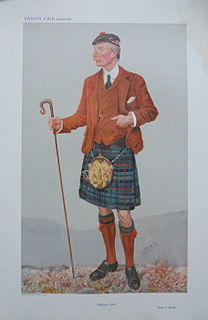
Sir Peter Jeffrey Mackie, 1st Baronet was a Scottish whisky distiller and writer.
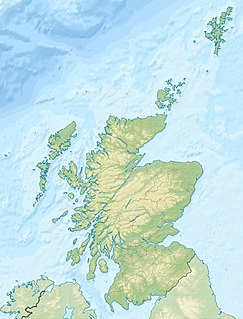
Fergushill is a small community in North Ayrshire, Parish of Kilwinning, Scotland. The Barony of Fergushill was held by the Fergushill family of that Ilk and the area has a complex history.

John Hamilton Inman was an American capitalist who invested in cotton, coal, iron and steel, and railroads, especially in the impoverished American South during the Reconstruction Era. While he is remembered as a tycoon in the age of laissez-faire, cut-throat capitalism, he nevertheless helped the economic development of his native state and the South in general.
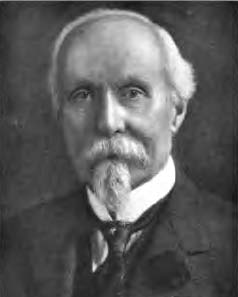
John Pitcairn Jr. was a Scottish-born American industrialist. With just an elementary school education, Pitcairn rose through the ranks of the Pennsylvania railroad industry, and played a significant role in the creation of the modern oil and natural gas industries. He went on to found the Pittsburgh Plate Glass Company, an early industry innovator which quickly grew into the largest manufacturer of plate glass in the United States, and amassed one of the largest fortunes in the United States at the time.
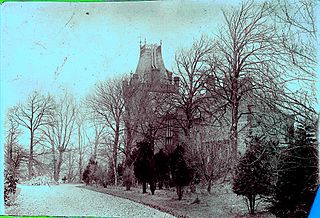
Dalmore was a country house and small estate in the Parish of Stair, East Ayrshire, on the River Ayr, East Ayrshire, Scotland
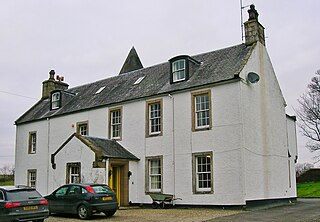
Monkredding formed a small estate in the Parish of Kilwinning, North Ayrshire lying between Kilwinning and Auchentiber on the B778. The property was originally held by the Tironensian monks of Kilwinning Abbey and was the 'Monk's Garden', the rest home for the brothers. Monkcastle near Dalgarven was the abbot's country retreat. Monkredding remains in good condition and is in use as a private house in 2010.
John Ferguson (1787–1856), was a Scottish businessman and philanthropist. He was the founder of the Ferguson Bequest Fund.
James Monroe Hall (1851–1935) came to the town of Tulsa in what was then known as Indian Territory. James and his brother, Harry C. Hall, operated a tent store that had followed the route of the Atlantic and Pacific Railroad and selected the site where the road would stop at Tulsa. They initially selected a site where the railroad crossed what would become Lewis Avenue and pitched a tent for the store there. This location was just inside the boundary of the Cherokee nation. When the Halls discovered that the Creek Nation had less restrictions on the activities of white merchants, they moved the store a couple of miles west to what would become First Street and erected a more permanent wooden building.

Barkip, also known as The Den, is a hamlet in North Ayrshire, Scotland about three miles south-west of Beith on the A737 road to Dalry. The earliest recorded name is 'Blairkip'. In the Gaelic language, the name Barkip comes from bar ("top"), and kip. It is not clear when or why the name 'The Den' started to be used although it appears in the local press as both in 1898, however in Scots as in old English one meaning is 'A hollow between hills,' which is certainly an accurate description of the geography of the area that Barkip lies in. Following construction of a new road, Barkip no longer sits on the main Beith to Dalry road.

The remains of the old castle of Kersland lie about 1.5 miles to the north-east of the town of Dalry in North Ayrshire, Scotland, in the old Barony of Kersland. The River Garnock lies nearby.

William Stafford was a coal mining engineer and mine superintendent for the North Western Coal and Navigation Company who was responsible for determining the location of the City of Lethbridge, Alberta, Canada.
Richard H. Keith (1842–1905), also known as R.H. Smith, was a coal and lumber businessman. He arrived in Kansas City, Missouri in 1871 with forty dollars and started a small coal yard. From that beginning evolved an empire spanning several states, that included coal, timber, sawmills, railroads, and even the building of towns.
James Hugh McBirney was an Ireland-born Oklahoma banker and bank organizer.
Sir Richard Mackie KONS COCI (1851–1923) was a 19th-century Scottish businessman involved in ship brokerage and coal exporter who served as Provost of Leith from 1899 to 1908. He owned the shipping companies of Richard Mackie & Company and New Line Ltd.
References
- 1 2 3 4 Blackmar, Frank Wilson (1912). Kansas: a cyclopedia of state history, embracing events, institutions, industries, counties, cities, towns, prominent persons, etc. ... with a supplementary volume devoted to selected personal history and reminiscence (Public domain ed.). Standard publishing company. pp. 482–. Retrieved 19 February 2012.
- ↑ Fuel magazine: the coal operators national weekly (Public domain ed.). Fuel Pub. Co. 1910. pp. 811–. Retrieved 19 February 2012.
- ↑ Kansas. Banking Dept (1902). Biennial Report of the Bank Commissioner (Public domain ed.). pp. 177–. Retrieved 19 February 2012.